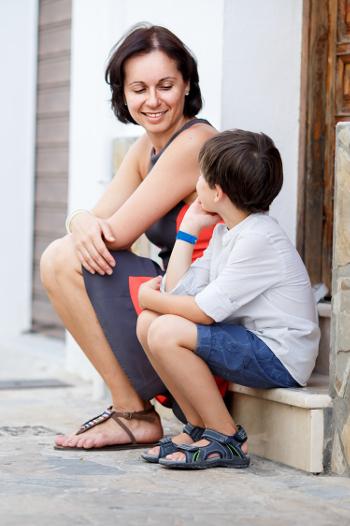What happened today?
Duration/age

Every day many different things happen. Some of them are planned and predictable but others just pop up.
Make time with your child at the end of each day to talk about the different things that happened. You might talk about events that you did together, ones that suddenly came up or things that happened to your child while they were at kindy or childcare.
As you talk together about your day, remember to give your child time to think and respond to what you are saying. One way to keep the conversation going is to ask questions about what happened.
What was the best thing that happened at kindy today? Why was that so good?
Materials you will need
- Your voice
Skills this activity improves
Why does this matter?
As your child takes part in retelling what happened over the day, they are developing their listening skills, observational skills and imagination.
As they ask questions about what happened during the day, they are learning to hold a conversation with another person and to use language that will extend the conversation. As they ask or listen to what is being said they are learning to process the information they hear and to use language that is related to that topic.
What does this lead to?
Retelling their day helps your child to develop a rich oral language. It allows the listener to see what your child has seen through the description of the event.
Retelling stories helps your child to develop good listening skills and to ask questions. As there are no pictures to give clues to what is happening in the story, if your child stops listening or is distracted they will not be able to follow the story and know what is going on.
Talking together about what you have noticed or done during the day helps your child to ask questions. As they notice objects or describe events, they can group them and compare the differences. As they talk about what they notice they are developing language to describe their thinking and observations.
Language to use
- When, why, where, what, how, who
- Today
- Early, late, morning, afternoon, lunchtime, dinner time
- Before, after, during, while
Questions to use
- Who was there?
- Why do you think that happened?
- How could we change what happened?
- What was the best bit?
- Why do you think I did that?
Useful tips
- You might also like to take a look at the activities Telling stories and Storytelling stones.
- If your child is a little younger use a picture to help tell the story. This will help them to focus and listen.
- The blue book has information about language development and ages and stages.
- Try to use a mixture of open and closed questions. Open questions help to keep the conversation going. Closed questions give the answer and stop the conversation.
- Remember to talk to your child in your home language.
More ideas
- You could record your conversations digitally or in a scrapbook.
- Make a routine for catching up. It could be over the dinner table, at bath time or once a day.
Variation by age
Birth to two year olds
- Talk to your child about activities that have actually happened. This could include things they ate during the day or places they have been.
Three to five year olds
- Make a question bag. As you talk, take turns to pull out a question. Ask the question to the person whose turn it is to talk. This will help to keep the conversation going and help to deepen your child’s thinking.
Questions to ask
- What did you eat today?
- What did you have for lunch?
- Who was at Grandma’s house?
- Did you have a sleep today?
- Did you have a bath at Grandma’s?
Questions to ask
- Who was there?
- Why do you think that happened?
- How could we change what happened?
- What was the best bit?
- Why do you think I did that?
Language to use
- Food, snack, fruit, lunch, dinner
- Sleep, bath
- Where, what, how, who
Language to use
- When, why, where, what, how, who
- Today
- Early, late, morning, afternoon, lunchtime, dinner time
- Before, after, during, while


